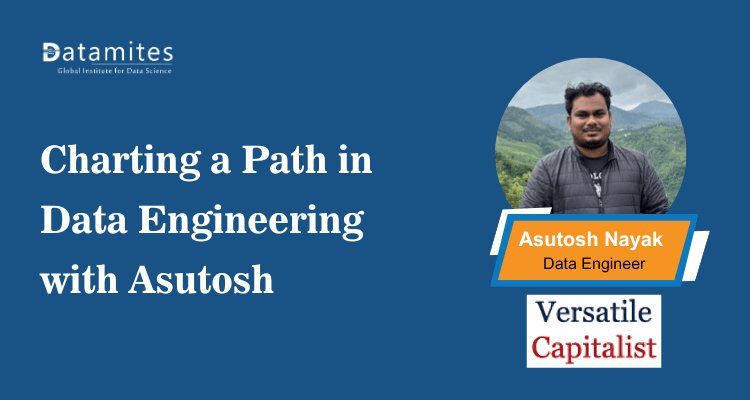Charting a Path in Data Engineering with Asutosh
Explore practical insights and strategies in data engineering with Asutosh, covering skills, tools, and career guidance to help you navigate and excel in the field.

Data engineering is one of the fastest-growing fields in technology, yet for many newcomers, it can feel intimidating. Tools, cloud services, and programming languages all converge in this space, making it both challenging and rewarding. Take Asutosh Nayak, he started his career in Salesforce development, a completely different domain, yet he successfully transitioned into a data engineering role at Versatile Capitalist. How did he do it? By systematically learning the right tools, gaining hands-on experience, and understanding how data flows from source to warehouse.
Watch Datamites success stories and you’ll see how learners like Asutosh turn determination into real career breakthroughs. In this article, we dive into his journey, exploring the challenges he faced, the skills he prioritized, and the strategies that made his transition possible. Whether you’re a seasoned IT professional looking to pivot or a beginner curious about data engineering, his insights offer a roadmap you can follow.
Asutosh’s Journey into Data Engineering with DataMites
Asutosh turned his curiosity into a career by enrolling in DataMites data engineering course, gaining the skills needed to secure a job he once thought was beyond his reach.
1. Can you introduce yourself and your current role?
I’m Asutosh Nayak, currently working as a data engineer at Versatile Capitalist. I have six years of IT experience. I started in the Salesforce domain and transitioned into data engineering about six months ago, learning Python, SQL, and AWS along the way.
2. How did you get started in data engineering?
Initially, my company began projects that required data engineering skills. I was new to the field and had no prior experience with Python or AWS. To bridge that gap, I joined Data Mites to learn the necessary technologies and apply them to my projects.
3. What programming languages and tools did you start with?
I started with Python and SQL. Over time, I moved into cloud technologies, specifically AWS, using services like S3, Redshift, Lambda, and Apache Airflow.
4. Did you have programming experience before data engineering?
Yes, I had some background from my computer science education and prior Salesforce experience, but I wasn’t familiar with the full stack of data engineering tools.
5. What is the role of SQL in data engineering?
SQL is the foundation. Without a strong grasp of SQL, you can’t manage or process data efficiently. It’s the starting point before learning cloud tools and orchestration platforms.
6. How do Docker and Airflow fit into the workflow?
Docker helps host applications and services, while Apache Airflow is an orchestration tool used to schedule and manage workflows. In my current project, Airflow is heavily used, while Docker plays a smaller role.
7. Why are cloud platforms like AWS important for data engineers?
AWS allows scalable storage, compute, and orchestration. Using services like S3, Redshift, and Lambda, we can efficiently handle large datasets. It also provides a stepping stone toward machine learning and data science.
8. Can learning data engineering skills lead to other career paths?
Absolutely. Skills in Python, SQL, and cloud platforms are transferable to roles like data scientist or ML engineer. The core concepts remain the same, though additional learning may be required.
9. What expectations do clients have for a data engineer?
Clients expect us to integrate multiple data sources Salesforce, Oracle, MSSQL, or third-party APIs into a centralized data warehouse. These pipelines must handle daily updates, ensuring accurate and timely data for end-users.
10. How do you manage multiple data sources in a project?
We create data pipelines for each source. For example, Salesforce credentials are validated, and a Lambda function ensures data is fetched and uploaded into Redshift, either directly or via S3.
11. What is the process for creating a data pipeline?
First, authenticate with the data source, then define the data pipelines and create activities. Each activity specifies the objects or tables to extract (like accounts, contacts, leads) and their destination. Lambda functions handle execution in the background.
12. How is scheduling handled in data engineering projects?
We use Apache Airflow to schedule activities, whether they run every 15 minutes, daily, or monthly. Each schedule triggers a Lambda that orchestrates the workflow.
13. How do you deal with large datasets in AWS?
Initially, we used AWS Glue, but processing large datasets proved costly. To optimize costs, we migrated to Airbyte, an open-source ETL tool deployed in Docker. This reduced expenses while still managing large data pipelines effectively.
14. What challenges did you face while transitioning from Salesforce to data engineering?
The biggest challenge was learning entirely new technologies like Python, AWS services, and orchestration tools. Adapting to cloud environments and understanding data workflows took time, but structured learning and hands-on projects helped.
15. How does your current project handle front-end and back-end responsibilities?
The front-end is built with React, handled by a separate team. My team focuses on the back-end, dealing with Python scripts, SQL queries, and cloud infrastructure for data pipelines.
16. How important is it to understand both the technical and business sides of data engineering?
It’s crucial. Understanding client requirements, data structures, and business goals ensures that pipelines are efficient and aligned with organizational needs. Technical skills alone aren’t enough.
17. What advice would you give someone starting in data engineering?
Start with SQL and Python, get comfortable with cloud platforms like AWS, and understand orchestration tools like Airflow. Hands-on practice with real datasets is essential. Be ready to learn continuously because tools and best practices evolve quickly.
Refer to these articles:
- Athulya’s Journey: From SEO Analyst to Data Engineer
- Apoorva’s Journey from Fresher to Data Engineer
- Keerthana’s Transformation into a Data Engineer
Lessons from Asutosh’s Strategic Shift into Data Engineering
Asutosh’s journey shows how proper training and a focused approach can transform a career change into a success story.
- Asutosh Nayak transitioned from Salesforce development to data engineering after six years in IT.
- He gained expertise in Python, SQL, and AWS through structured learning at DataMites.
- SQL forms the core skill for data engineering, especially for querying and transforming data.
- AWS services like S3, Redshift, Lambda, and Glue are essential for building data pipelines.
- Airflow is widely used for orchestrating and scheduling automated data workflows.
- Data engineers integrate multiple sources, including Salesforce, Oracle, MSSQL, and APIs, into a centralized data warehouse.
- Pipelines are automated to run at regular intervals, ensuring updated and consistent data.
- AWS Glue simplifies ETL processes but can be expensive for large-scale data operations.
- Open-source tools like Airbyte provide cost-effective alternatives for data integration.
- Practical exposure to real-world projects helped Asutosh understand data engineering challenges.
- Strong data engineering skills can lead to career growth into data science and machine learning roles.
- Beginners are advised to start with SQL and Python before advancing to cloud platforms, orchestration, and ETL tools.
- Hands-on experience with AWS and Airflow is crucial to managing pipelines effectively.
- Continuous learning and adapting to new tools are key to succeeding in data engineering.
Refer to these articles:
- Why Data Scientist Career in Bangalore
- Why Data Scientist Career in Pune
- Data Science Course Fee in Pune
- Data Science Course Fee in Bangalore
Asutosh Nayak’s journey shows that shifting from one tech domain to another is entirely possible with curiosity and consistent effort. From Salesforce to mastering AWS, Python, and modern data pipelines, his story proves that the right skills and hands-on experience can open doors in data engineering and beyond. If you’re thinking about making a similar leap, take this as your cue: start small, focus on core tools like SQL and Python, and gradually build cloud expertise. The next data engineering success story could be yours.
If Asutosh’s journey inspires you, there’s no better time to explore a career in Data Engineering one of the fastest-growing and most sought-after fields in tech. With organizations relying heavily on data to drive decisions, the demand for skilled professionals continues to rise. According to IMARC Group, the global data science platform market is expected to grow from USD 15.2 billion in 2024 to a massive USD 144.9 billion by 2033. Enrolling in a top-rated offline Data Engineering course in Bangalore, Chennai, Hyderabad, Pune, Mumbai, or Delhi can unlock significant career opportunities and give you the skills to thrive in this dynamic field.
Coming from a background in Salesforce, Asutosh decided to pivot toward data roles. He joined a comprehensive Data Engineer course at DataMites Bangalore, where he gained hands-on expertise in Python, SQL, AWS, and modern data pipelines. Through consistent learning, offline classroom sessions, and capstone projects, including real-world data processing and cloud migration projects, he built both the skills and confidence to transition successfully. His training was strengthened by globally recognized certifications from IABAC and NASSCOM FutureSkills.
Today, Asutosh thrives as a Data Engineer, putting his technical skills to work on real-world challenges. His journey demonstrates how structured learning, mentorship, and hands-on experience can make a career transition both achievable and rewarding. Join thousands of learners who are equipping themselves with the skills that the tech industry demands today.
For those in Karnataka, enrolling in a Data Engineer Course in Bangalore offers in-depth technical training, hands-on projects, and career guidance to help launch your career.
Learners in Maharashtra can benefit from a Data Engineer Course in Pune, offering the same industry-driven curriculum and dedicated career support, equipping you with the skills to thrive in the fast-expanding data engineering field.

